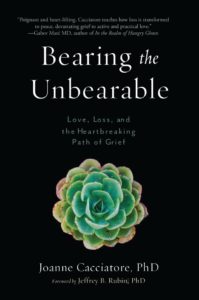Dr. Joanne Cacciatore is a tenured research professor who studies traumatic grief at Arizona State University. She is also a Zen priest, bestselling author, and a bereaved mother.
The following is an excerpt from her bestselling book, Bearing the Unbearable.
Let’s stop making deals for a safe passage.
—JOYCE WELLWOOD
Many people ask of those grieving: “Are you still feeling so sad?” “How long will you be feeling so sad?” “What can we do to stop you from feeling so sad?”
The thing about grief is that there isn’t a place or time at which we arrive once-and-for-all at peace, or healing, or completion.
Grief is a process, an unending long and winding road. The landscape changes as we travel the distance, some parts of the path barren and some more beautiful—but it’s the same road. And grief itself is the destination: at every moment of our grief, we are arriving.
But so many of us receive the antithetical message from within medical, spiritual, educational, and social systems that grief is pathological, a condition to be treated, cured, and eradicated. These messages from a compassion-deficient culture, explicit or tacitly embedded into the appraisal of normative grief, inform and influence our relationship to bereavement. This is one of the greatest challenges to the bereaved.
"Grief is a process, an unending long and winding road."
Our culture is rife with platitudes, psychologically imperialistic idioms, that propagate its understanding of grief. Some of these will sound familiar to any griever:
- “S/he is in a better place.”
- “S/he isn’t suffering anymore.”
- “Everything happens for a reason.”
- “It’s time to move on, to move forward.”
- “It’s not normal to feel that way.”
- “Grieving can easily become a mental disorder.”
- “Your (child, spouse, parent, grandchild, etc.) wouldn’t want you to be sad.”
- “I can’t believe you are still feeling grief.”
- “Maybe you should get on some medication.”
- “Shouldn’t you feel better by now?”
- “It’s not normal to hurt for this long.”
- “You can have other children.”
- “You have to forget this.”
- “Trust in God’s plan.”
- “Just let go.”
- “God needed an angel to tend His garden.”
- “Try (this therapy, that technique) to help you heal.”
- “Don’t think about it.”
- “Just think happy thoughts.”
- “Try to remember the good times.”
- “Don’t think about the bad times.”
- “Just replace the hard memories with good ones.”
- “You have to get back to life.”
"Our culture is rife with platitudes, psychologically imperialistic idioms, that propagate its understanding of grief."
Other members of grief-denying culture, fearful that the emotional contagion of grief will expose them to their own pain, try to justify their avoidance and defend themselves from the unthinkable. They try to fix grief—my friend the renowned psychotherapist Dr. Robert Stolorow calls this “the War on Grief.”
Other children or remarriage will not cure this.
It is normal to feel this way and for this long.
And there is no “better place” for those we love than with us.
Grief cannot, and should not, be fixed.
Our culture is terrified by powerful expression of painful emotions and so uses its institutions and agencies to quell grief, to force people into dark corners of hiding, to silence grieving wails with pills, to forcibly calm and control that which should not be controlled. It uses its platitudes to perpetuate myths and misinformation\ about what is normal in grieving, and the temptation to move away from our own suffering is real and seemingly sensible to some.
Yet there is no place for the tidy, the neat, or the civilized in mourning.
"Yet there is no place for the tidy, the neat, or the civilized in mourning."
Grief violates convention: it is raw, primal, seditious, chaotic, writhing, and most certainly uncivilized. Yet grief is an affirmation of human passion, and only those who are apathetic, who stonewall love, who eschew intimacy can escape grief’s pull.
No intervention and no interventionist can “cure” our grief. And we are not broken—we are brokenhearted.
Grief is not a medical disorder to be cured.
Grief is not spiritual crisis to be resolved.
Grief is not a social woe to be addressed.
Grief is, simply, a matter of the heart—to be felt.
As the Kotzker Rebbe, a nineteenth-century Hasidic rabbi, said: “There is no heart more whole than a broken one.”
"[W]e are not broken—we are brokenhearted."
 As a tenured research professor who studies traumatic grief at Arizona State University and spearheads the graduate Certificate of Trauma and Bereavement, Dr. Joanne Cacciatore has worked for over two decades to help those who have experienced traumatic loss learn to be with and integrate their losses and stay connected to their loved ones who have died. Her bestselling book, Bearing the Unbearable, won the Foreword INDIES Gold Medal for Self-Help.
As a tenured research professor who studies traumatic grief at Arizona State University and spearheads the graduate Certificate of Trauma and Bereavement, Dr. Joanne Cacciatore has worked for over two decades to help those who have experienced traumatic loss learn to be with and integrate their losses and stay connected to their loved ones who have died. Her bestselling book, Bearing the Unbearable, won the Foreword INDIES Gold Medal for Self-Help.
You can buy it here.
Or if you’re a member of the Wisdom Experience, click here to start reading now.
Now Dr. Jo has created an online course with the same name as her book.
In her new online course, Bearing the Unbearable, Dr. Jo opens a space to process, integrate, and deeply honor our grief, with her lessons augmented by guided meditations and yoga exercises by co-teacher and fellow counselor Karla Helbert. Dr. Jo reveals how grief can open our hearts to connection, compassion, and the very essence of our shared humanity.
LEARN MORE OR ENROLL HERE
| There are no products in your cart. |
